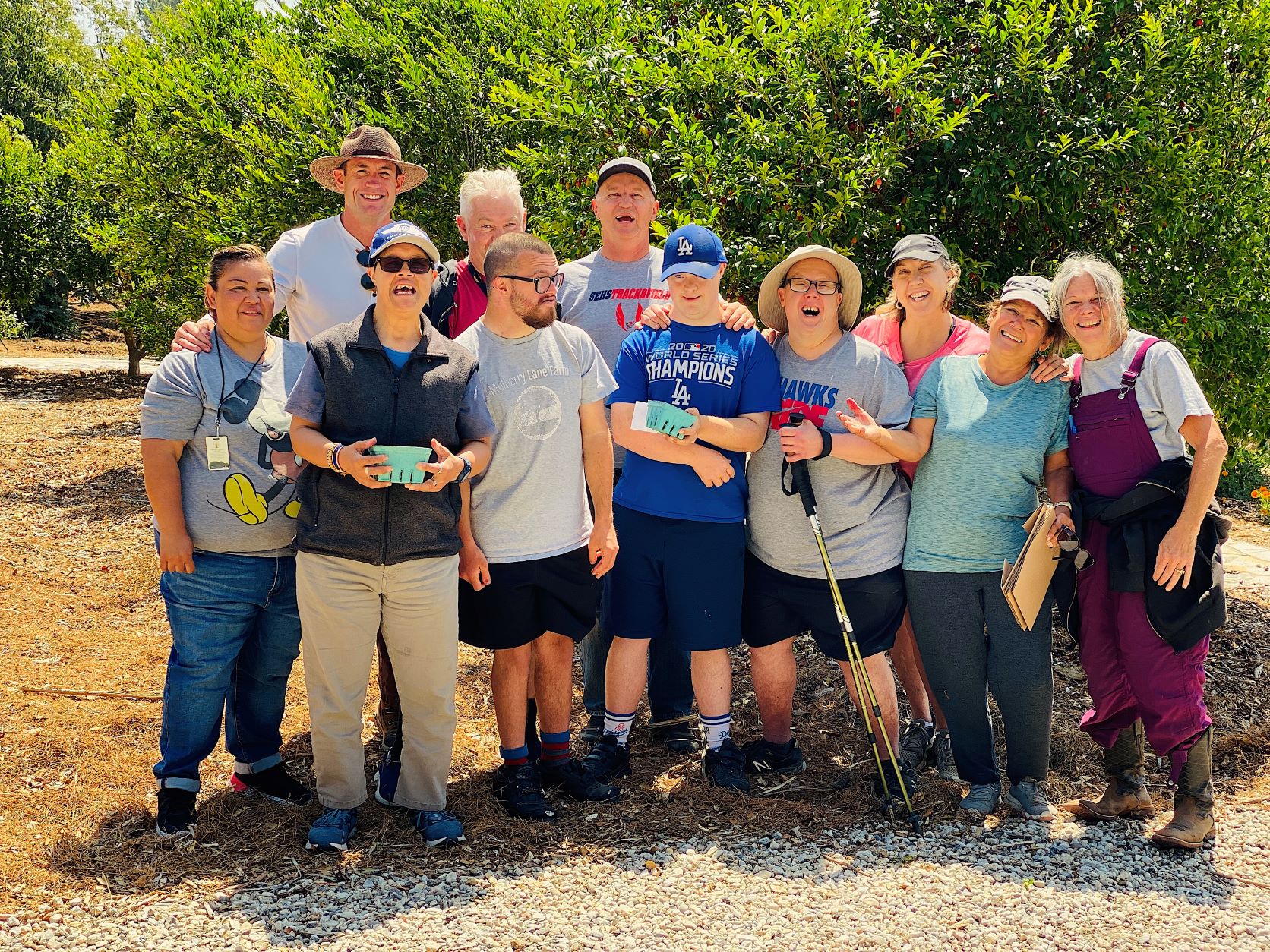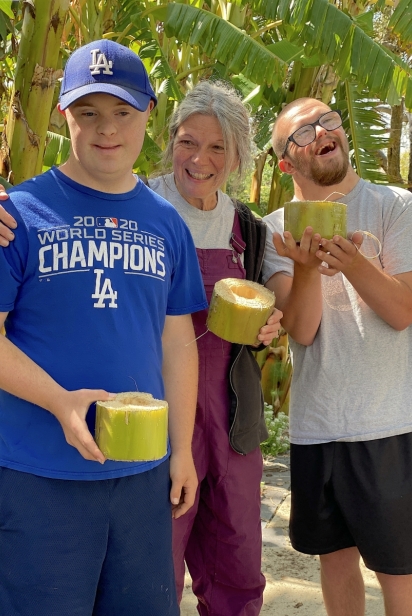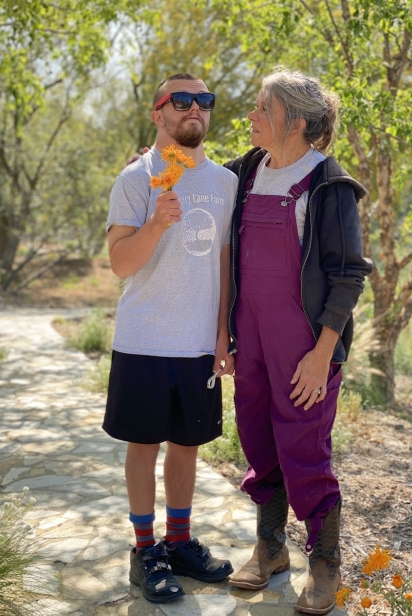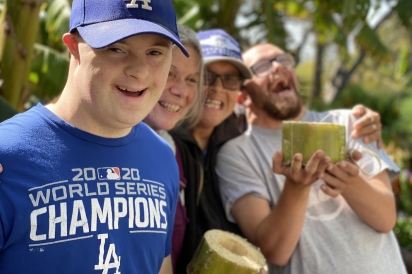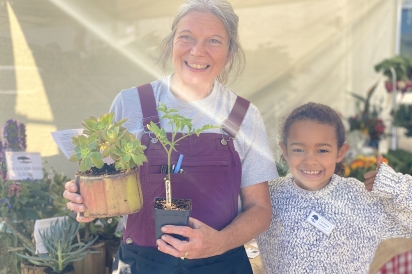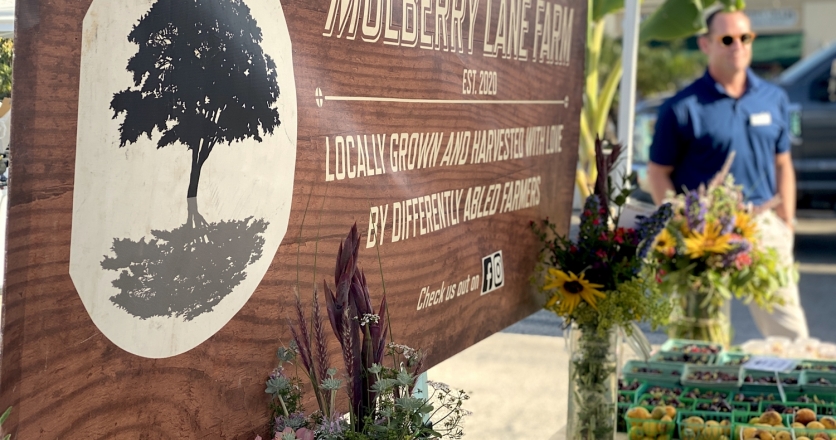All Roads Lead to Mulberry Lane
“What smells like lemon, tastes like pepper and turns your tongue and mouth numb?” Karen Meier wondered to herself as she tasted the ripened fruit of yet another mysterious plant on her farm in Somis. “Either I’ve found a cure for COVID or I’ve got COVID,” she thought.
It was Thursday and the farmers’ market was Saturday—no time to get the agricultural commissioner to come out and approve this new fruit—so she brought a small sample to the market instead. A customer of Chinese descent came up to the booth and excitedly said, “Sichuan peppercorns!” The peppercorns brought back so many fond food memories, the customer said, and here they were at her local farmers’ market.
Karen had the same feeling when she tasted her first batch of bananas at Mulberry Lane Farm. The memory took her back 60 years to when she was 2 years old in Valencia, Venezuela. Her father worked for Ford when she was young, which transferred the family there.
THE UPSIDE OF DOWNS
Buying the farm was a brand-new endeavor in the Meiers’ more than 20-year commitment to serving, supporting and educating families and individuals connected to those with Down syndrome through their nonprofit, The Upside of Downs. Karen and her husband, Ron, had six children, but as they began to understand what their two sons with Down syndrome needed, they felt compelled to share what they had learned.
Volunteers of all abilities, including adults with Down syndrome and autism from local organizations like the Arc of Ventura County and SAGE Services in Camarillo work happily each week at Mulberry Lane Farm planting, weeding, saving seeds, and harvesting and tasting fruit. The team then proudly offers the fruits of their labor at the Camarillo Farmers Market on Saturdays.
MYSTICAL LAND
Forty years ago, the land where Mulberry Lane Farm now lies was bare—but the owner was a self-taught botanist and collector who, after studying the microclimate of the property, built it from his own research and travels, filling it over the last four decades with exotic and rare, mostly tropical, fruit trees from Australia, China and other places around the world.
His health was deteriorating so he had to leave his beloved farm. Sadly, he passed on the day the Meiers moved in, leaving many mysteries as to the origin, care and harvesting of plants on the property.
Karen spends her days learning from the land, tasting fruit that has fallen from the trees, checking them for ripeness, identifying them by researching on the Internet, meeting people at the market and reading dusty books on horticulture left behind in the farmhouse. “There are so many different cultures represented here,” she says.
Besides the groves and orchards of familiar fruits such as bananas, papayas, mangos, figs, persimmons, pomegranates and Asian pears, Mulberry Lane Farm brings an entirely unrepresented collection of fruits to the table—all from just six acres of land.
There are Malabar chestnut trees that grow alongside Chinese wampi berries and pomelos. There are Malaysian guavas, Peruvian apple cacti, dragon eye fruit from tropical Asia, Asian loquats and Pakistani mulberries. The finger limes, lilly pilly berries and bunya trees are Australian.
From the cherimoya fruits on the farm, native to the South American tropics, that grow easily up to three pounds each, to the tiny Sichuan peppercorns of China, there is an abundance of fruit throughout the year in quantity and variety. Mulberry Lane Farm takes Karen on a seemingly endless adventure, which she wholeheartedly embraces. But it’s only the latest in a series of adventures.
FINDING HOME
After delivering her fifth child, Steve, in their car, on a freezing night in Michigan, she felt as though she had just participated in an incredible miracle. But the next morning she was told he had Down syndrome, and that her best options were adoption or an institution—or she could bring him home and hope for the best.
Without hesitation, she did just that, and embraced the miracles she knew would follow. Two years later, an orphanage contacted the couple through an online Down syndrome support network they belonged to, and they adopted their youngest son, Tom, also with Down syndrome.
They raised their six kids in the Midwest until 2016, when Ron’s job at General Motors moved the family from Illinois to California. The Meiers’ four older children were living on their own, and Steve and Tom were both approaching the cutoff age of 22 for their special education through public schools.
The family needed to find a home, a high school for Tom to finish his senior year, and a post-secondary education program for Steve within a 20-mile radius of Ron’s new office in Westlake Village. They had moved before, but Karen says this was the first time she found everything she needed and even what she wasn’t expecting to find.
Just a week after moving to Moorpark, they walked on the campus of Padre Serra Catholic Church in Camarillo and it immediately reminded Karen of the feeling and look of the foothills of the Andes, and the places where she had school picnics as a child in Venezuela.
Then, what she describes as a friendly herd of parishioners rushed over to them, including folks like Bill Routolo, a 49-year-old with Down syndrome (who regularly works at Mulberry Lane Farm now), and his sister, Lisa, who took custodial guardianship of Bill when their parents passed. For the first time, they had found a community of families they could share life with who understood the challenges and blessings of Down syndrome.
PLANTING MYSTERY SEEDS
Two years later, Steve had “aged out” of school and was waiting for an opening at one of the county’s adult day programs, which they were told could take up to two years. Meanwhile, the Meiers were invited on a tour of Apricot Lane Farms by their neighbors a few doors down, whose daughter is Molly Chester, co-founder and farmer at the biodynamic farm in Moorpark with her husband, John. During the tour, when Karen stopped at the garden area and met manager Joy Joyce, she knew this was where Steve needed to be.
Karen and Steve began volunteering together for Joy at Apricot Lane Farms three days a week, “like guinea pigs,” Karen says, because they didn’t have a special program or set of activities developed for those who are differently abled. It turns out as they were planting seeds for Apricot Lane Farms, they were also cultivating the idea for their own farm and providing this kind of experience for other adults with disabilities and their caregivers.
During this time, Karen stepped into a new role with Steve as teacher, rather than mom, and she quickly began to understand the differences. One day they were doing the simple task of saving fennel seeds by loosening them from the plant and letting them fall on butcher paper. The noise turned out to be a sensory trigger for Steve and he shut down for hours.
Karen wondered if she could somehow channel the professional therapists that Steve had worked with and utter the magic words to snap him out of it. “I suddenly had a deep, profound [gratitude] for their teachers over the years, their level of commitment and how they just knew what to do with my boys.”
Steve didn’t want to touch the dirt after all those years of being asked to keep his hands clean. Karen told him, “You like milk and cows make milk, cows need grass and grass needs dirt.” As they overcame challenges together at the farm, they both adopted a new mind-set that Karen describes as “out of dirt comes all good things.” (Pullquote)
One great project inspires another, and Karen began to dream. What would it be like if we had an experience like working at Apricot Lane—for Steve and all the other adults with Down syndrome they had met here in their new community—without the pressure of production and sales?
Her curiosity led her on a road trip six hours north to Camphill Communities California, a residential farm in Northern California for special needs adults (there are over 100 such farms worldwide). She also called the Turtle Tree Seed Initiative in upstate New York, run primarily by a team of special needs individuals. She kept her research to herself; it felt like an off-the-wall idea.
Turns out, Ron also was busy thinking about the future and, having lived on a farm as a young child in North Dakota, was imagining himself on a farm as he approached retirement. It was February 2020 when he said to Karen, “How about we buy a farm?”
FROM VOLUNTEER TO FARMER
Within two days, they were visiting the tropical fruit farm in Somis that would become Mulberry Lane Farm. By May, the Meiers moved into the cheerful sky-blue farmhouse on the property and named their new home after the lush mulberry tree that shades the drive in.
Karen took the leap with a big heart, yet zero experience in farming. Joy, whom she met back at Apricot Lane, soon joined the team at Mulberry Lane Farm and helps Karen navigate the needs of the farm and its volunteers.
How you can help!
1. Purchase seeds from the Bright Horizons Seed shop on Etsy.com (see link below). Sales go directly to the Upside of Downs.
2. Make a donation to the Upside of Downs 501(c)(3), which funds maintenance of the farm and its no-fee programs for special needs individuals.
3. Shop at the Mulberry Lane Farm stand at the Camarillo Farmers Market on Saturday mornings from 8am–noon in Old Town Camarillo. Mention this article (and a new exotic fruit you’d like to try) and enjoy 10% off your purchase!
To make a tax-deductible contribution please visit: UpsideOfDowns.org/
Check out the seed shop: https://www.etsy.com/shop/BrightHorizonSeeds
Camarillo Farmers Market: CamarilloFarmersMarket.com/
Follow the Mulberry Lane Farm adventure on Instagram (@mulberrylanefarm.somis) and Facebook
For more of their story visit UpsideOfDowns.org/about/our-story


